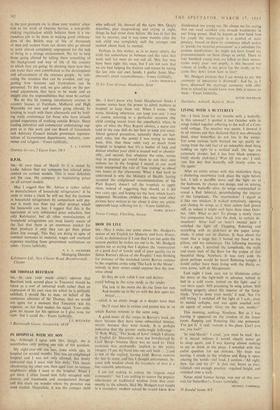SIR,—May I make one point about Mr. Hodgart's review of
my English for Maturity and Iron, Honey. Gold, to demonstrate if I can that I am not quite the narrow puritan he makes me outto be. Mr; Hodgart quotes me as saying that 1 deplore the 'resurrection of a good deal of bawdy stuff of poor quality (as in James Reeves's Idiom of the People): I was thinking for instance of the wretched verses Reeves restores to the exquisite erotic song 'The Lark in the Moon': nobody in their senses could suppose that the non- sense about
So they do lark relish I vow and declare could belong to the same mode as the tender The lark in the morn she do rise from her nest And mounts up in the air with the dew upon her breast ...
--which is an erotic image at a deeper level than She'll roast him in onions and pound him in 'ot which Reeves restores to the same song. .
A good many of the verses in Reeves's book. are there because they have some sensational interest, merely because they were bawdy. It is perhaps indicative that the greater erotic-tragic folksongs- '0 Waly Waly,' 'The Seeds of Love' (which I discuSs in English for Maturity)—were not bowdlerised by Cecil Sharp—because there was no need to. Their eroticism was profoundly implicit in the pdetic imagery CI put ni) hand into one soft hush ...') and is not of the explicit. leering kind. Reeves restores the leer to some, and this 1 thought unfortunate, be- cause folk wisdom about the treachery of love is a line valuable inheritance.
am not seeking to restore the 'organic rural community' : but I am seeking to restore the popular inheritance of traditional wisdom from that com- munity to the schools. Had Mr. Hodgart ever taught in a secondary modern school he would know how disinherited our young are. He abuses me for saying that our road accident rate reveals weaknesses in our living power. Had he known at first hand how for youth the motor-cycle is a symbol of male potency, forced on them by commerce which makes us 'greedy for material possessions' as a substitute for genuine stitisfactions--he might not have found my pronouncements on these things so awful. Three to four hundred young men are killed on their motor- cycles every year our pupils; is this because our volume of traffic is too great for the roads, or be- cause they don't know how to live?
Mr. Hodgart protests that I am wrong to say 'the ceremony of innocence is drowned': had he, as I have, discussed the marriage ceremony with chil- dren in school he would know how little it means to them.- - Yours faithfully, DAVID Hof mom:
Dueklake, Ashwell, Baldoek, Hera






































 Previous page
Previous page